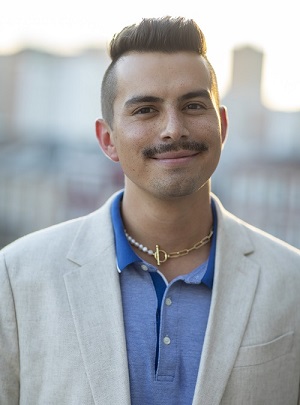Putting people first in conservation
Forrest King-Cortes joined the Land Trust Alliance in October as director of community-centered conservation. An ecologist by training, he previously worked as director of community engagement for The Nature Conservancy in Illinois, where he led a statewide team dedicated to connecting people with nature.

Forrest King-Cortes joined the Land Trust Alliance in October as director of community-centered conservation. An ecologist by training, he previously worked as director of community engagement for The Nature Conservancy in Illinois, where he led a statewide team dedicated to connecting people with nature.

Land Trust Alliance: Have you always wanted to work in conservation?
Forrest King-Cortes: My family really nurtured my interest in nature, and I knew from a young age that I wanted to work in conservation. People don’t think of cities as rich in outdoor experiences, but my whole childhood in Chicago was pretty much outside—gardening in my grandparents’ yard, walking to neighborhood parks, and yes, playing in the alleys and streets with friends until we were called inside. One thing I distinctly remember is being excited every summer for Eco-Explorer camp, which was held at one of the only nature centers in the city at the time. My parents would wake up at a ridiculously early hour in the morning to wait in line so they could register me for it. I have wonderful memories of staff at the camp who served as role models for me.
Land Trust Alliance: How do you explain community-centered conservation to others?
Forrest King-Cortes: Community-centered conservation is about putting people first in conservation, which can seem like an oxymoron because often conservation is thought of as protecting nature from people. But community-centered conservation brings people in and welcomes us all as part of nature. It’s a different way of doing conservation, and I think it leads to better outcomes in the long run. It’s also about being intentional with who is front-and-center in this work.
Land Trust Alliance: What does this work look like to you?
Forrest King-Cortes: Community-centered conservation prioritizes learning and building relationships. In many communities where we have not historically worked, we’re “the new people on the block,” so it’s our responsibility to build trust with individuals and groups that are rooted in and of the communities where we intend to work. If we’re doing this right, we start there and build together with communities. The end result is often unknown at first and that can feel uncomfortable, but I find it a rich space to be in.
Land Trust Alliance: What kind of change to you hope to see in the next decade?
Forrest King-Cortes: I hope we can see community-centered conservation as more than an add-on to our work, and instead as a just, impactful way to work. It’s a tiny nuance, but it’s the shift to seeing our responsibility as meeting the needs of people in addition to meeting the needs of nature. We’re not changing the essence of conservation, we’re changing the approach. And I want our movement to recognize and uplift more leaders of color, LGBTQIA+ people and people with disabilities to help drive this change. At Rally I was so energized to see community-centered conservation in the agenda and the plenaries, and to see so many people working hard at it, including land trusts sharing their experiences of doing this work and how it’s making a difference in their communities.

Land Trust Alliance: What's your life like outside of work?
Forrest King-Cortes: I’m a nature nerd through and through. I love getting outside. I’m very busy with Out in Nature, a group I founded a few years ago with my husband that is dedicated to creating a safe, affirming space for LGBTQIA+ people to get outside. I also love to have dinner parties with friends, and I caught the houseplant craze during the pandemic, which was a great stress relief. I love to read and my favorite genre is sci-fi and fantasy.
Read more on community-centered conservation in this blog by the Alliance's chief program officer, Jennifer Miller Herzog.